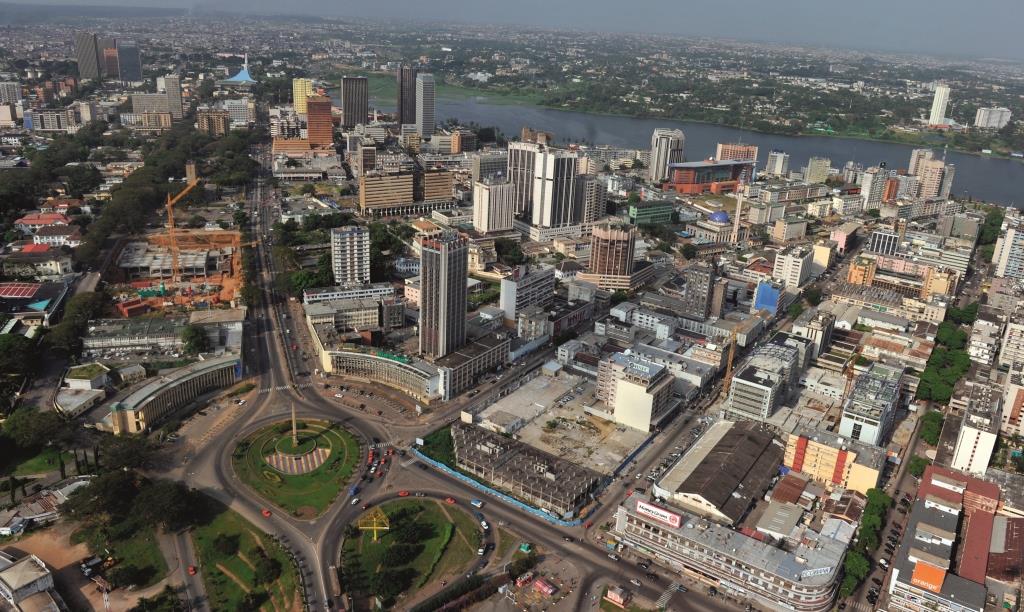Crossing Pont Félix Houphouët-Boigny in Abidjan, you get to see Côte d’Ivoire’s dichotomy clearly. In front of you, mid-rise buildings glow with neon lights through the darkness: Pepsi, Mitsubishi, MTN create a mask that hints at prosperity. But the queues of young men waiting on street corners and the cranes pecking at the drifts of garbage on the water’s edge tell a different story.
Once the region’s most sophisticated economy, Côte d’Ivoire is now a case study for the economic impact of conflict and political paralysis. But even though its election descended into violence and the country teetered on the brink of another civil war, the much-delayed completion of the transition from post-war junta to democratic state has put Côte d’Ivoire back on the path to regaining some of its former glory.
A shaky cease-fire, signed in 2003 to hold the country together after an attempted coup, led to a government that controlled the south—under Laurent Gbagbo—and a north run by Forces Nouvelles rebels.
During that limbo, investors talked about the country’s potential and the build up of money that was waiting to be released once the election finally passed. But it was delayed, then delayed again, until it seemed as though the delay would be interminable. While regional neighbors, such as Ghana, saw their economies boom and attract international investment, Côte d’Ivoire was in stasis.
In November 2010, there was one last twist. The incumbent old warhorse Gbagbo refused to yield, leading to a violent standoff. The victor, Alassane Ouattara, formed a government within the compound of the Golf Hotel in Abidjan, protected by a ring of UN peacekeepers while militias fought in the city around them.
Escalating international pressure and financial sanctions eventually led to the collapse of Gbagbo’s support. Ouattara, a former International Monetary Fund official, took over in April last year but not before the country had defaulted on its bonds by failing to make coupon payments to international creditors London Club, while its assets were frozen.
His early achievements—in reassuring investors that the arrears would be repaid and getting backing for debt relief from France—were encouraging, and today in Abidjan there is a cautious optimism. The city is not visibly transformed from two years ago, but construction projects are restarting and traffic is building. Though the change has not been dramatic, the lifting of the deadlock means that companies can finally plan beyond the short term.
“There’s a sense that a lot of things are possible,” says the director of the private equity firm Emerging Capital Partners’ (ECP) Abidjan office, Brice Lodugnon. The security situation has improved and there’s some certainty over the direction of the government, which has pledged to increase spending on infrastructure and agriculture.
The good news is that at least around Abidjan, infrastructure and utilities still function. There are good companies in many sectors and a relatively strong system of governance. Key industries, including financial services, are competitive and the country is still the world’s largest exporter of cocoa. But while Côte d’Ivoire has some of the political risk of a post-conflict environment, it does not have an abundance of underpriced opportunities. That’s a problem for investors.
Even before the crisis, there were tentative expansions into previously politicized industries, including cement making and flour milling, with companies from North Africa, as well as the country’s large French and Lebanese expat communities, moving into manufacturing and processing. Agribusiness group Olam has pledged a further $200 million in investments, while ECP is expanding its portfolio in the power sector. Rather than looking for a new cohort of investors, Ouattara’s government might find more support from those existing players, now free to make long-term plans.
Many businesses were battered by the 2011 crisis but now stoically downplay the human cost of that period, talking instead of the relief at their newfound ability to plan beyond the short term. Still, the scars are there. At the height of the violence, pro-Gbagbo forces executed one of the country’s largest foreign investors—Yves Lambelin, the former president and patriarch of Sifca. That story gets told regularly.
International investors speak highly of Ouattara. One CEO of a multinational operating across the continent said that the president—while his ability to create a government is unproven—is one of the most accomplished leaders in economic planning in Africa.
Politics are bound to be difficult. An hour’s flight north of Abidjan is Ouattara’s hometown of Bouaké, until recently the headquarters of the Forces Nouvelles. There, the difference in development is marked. The roads are in worse condition and the security presence, in the form of UN peacekeepers from Pakistan, are far more visible. People living there refer to the country’s “reconstruction”.
Further up country the situation is worse, with an entire generation denied access to education after the southern government abandoned schools. An executive in a cotton company, with an extensive presence in the north, called the state of some areas “appalling”.
Making sure that the country’s redevelopment is even and that the government—headed by a northerner—does not re-open divisions that are still fresh, will be a massive task for the new president.
